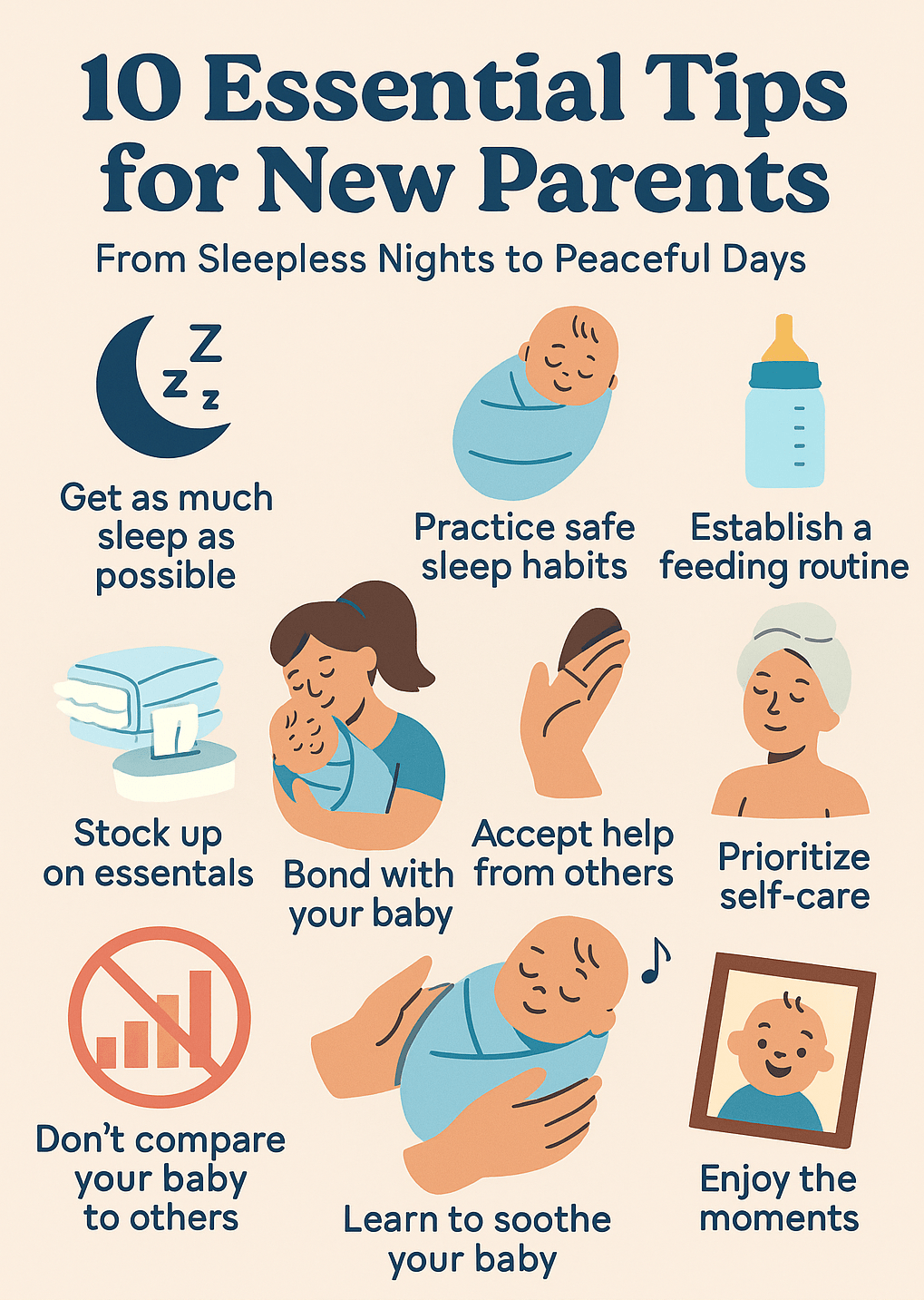
👶🏽 10 Essential Tips for New Parents: From Sleepless Nights to Peaceful Days
Share
✨ Introduction: Welcome to the Most Beautiful (and Exhausting) Adventure
Becoming a parent for the first time is one of life’s greatest joys—but it also brings plenty of new challenges. Sleepless nights, endless diaper changes, and new routines can feel overwhelming. But don’t worry—with the right strategies, you can embrace this new chapter with more peace, confidence, and joy.
Here are 10 essential tips to help you navigate the early days of parenthood while staying grounded and connected to what matters most: your growing bond with your baby.
1. 😴 Get as Much Sleep as Possible
Sleep deprivation is one of the biggest hurdles for new parents. It’s tempting to "catch up" on chores when your baby sleeps—but sleep when your baby sleeps whenever you can.
Pro Tips:
- Nap during the day without guilt.
- Create a short, calming bedtime routine for yourself too.
- Share nighttime duties with your partner if possible.
- Consider "shift sleeping" during the first few months (one parent rests while the other handles nighttime care).
🧡 Remember: Sleep is essential for your mental health and patience.
2. 🛏️ Practice Safe Sleep Habits
Safe sleep can save lives. Follow guidelines recommended by the American Academy of Pediatrics (AAP):
- Always place your baby on their back for sleep.
- Use a firm, flat sleep surface (crib, bassinet, or portable play yard).
- Keep the sleep area free of pillows, blankets, toys, and bumper pads.
- Room-share (but not bed-share) for at least the first 6–12 months.
🔔 Tip: Use wearable blankets (sleep sacks) instead of loose blankets for warmth.
3. 🍼 Establish a Feeding Routine
Feeding is about nutrition—and comfort and connection.
Helpful Tips:
- Follow your baby's hunger cues (rooting, sucking on fists, fussiness).
- Try to feed on demand at first (every 2–3 hours for newborns).
- Gradually establish a predictable schedule based on your baby's natural rhythms.
- Keep a feeding log (time, amount, notes) during the first few weeks to help track patterns or identify concerns.
🧡 Remember: Growth spurts (around 3 weeks, 6 weeks, and 3 months) often mean more frequent feedings!
4. 🧻 Stock Up on Essentials Before Baby Arrives
Preparation reduces stress. Have these items ready:
- Diapers and wipes
- Diaper rash cream
- Onesies, sleepers, and socks
- Swaddles or sleep sacks
- Burp cloths and bibs
- Baby-safe laundry detergent
- Nursing supplies (or formula, bottles, and a sterilizer)
- A thermometer and infant medicine kit
🔔 Tip: Set up diaper stations on each floor of your home for quick changes.
5. 🤱 Bond with Your Baby Every Day
Building a strong emotional connection boosts your baby's brain development and emotional security.
Ways to Bond:
- Skin-to-skin contact (especially in the early weeks)
- Talking, singing, and reading aloud
- Making eye contact during feedings and diaper changes
- Babywearing for closeness and convenience
- Gentle massage after baths
🧡 Reminder: You are your baby’s favorite person—your touch, voice, and smell bring comfort!
6. 🙋♀️ Accept Help from Others
It’s okay (and wise!) to accept support. Saying "yes" to offers of meals, babysitting, or errands can free you up to rest and focus on your baby.
Ideas for Delegating:
- Ask family to help with laundry or dishes.
- Arrange for a friend to pick up groceries.
- Join a new parent group for emotional support and advice.
🔔 Tip: Create a "help list" before birth—so when people ask "How can I help?" you’re ready.
7. 💆♀️ Prioritize Self-Care (It’s Not Selfish)
Self-care isn't a luxury—it’s essential for new parents.
Small Ways to Recharge:
- Take a hot shower daily.
- Spend 10 minutes outside for fresh air.
- Eat nourishing meals (keep healthy snacks on hand).
- Practice mindfulness or deep breathing.
- Schedule small joys: a funny podcast, 10 minutes of journaling, a cup of tea.
🧡 Tip: A well-rested, emotionally balanced parent can better meet a baby's needs.
8. 🤱 Learn to Soothe Your Baby
Your baby’s cries are their way of communicating. Over time, you’ll learn what they need—but in the beginning, try different soothing techniques:
- Swaddling (if appropriate for their age)
- Gentle rocking or rhythmic movement
- Soft shushing sounds or white noise
- Pacifiers (if recommended)
- Warm baths
🔔 Tip: Remember the "5 S's" from Dr. Harvey Karp’s Happiest Baby on the Block: Swaddle, Side-stomach position, Shush, Swing, Suck.
9. 🚫 Don’t Compare Your Baby to Others
Milestone anxiety is real, especially when you hear about another baby rolling over or babbling early. But development is a range, not a race.
Focus on:
- Your child’s steady progress over time.
- Enjoying the unique moments you share.
🧡 Tip: Always consult your pediatrician if you have concerns, but avoid the social media comparison trap!
10. 📸 Enjoy the Moments (Even the Messy Ones)
The newborn days are exhausting—and fleeting. Amid the spit-up, diaper blowouts, and sleepless nights are tiny smiles, giggles, first coos, and sleepy cuddles.
Ways to Capture the Magic:
- Take candid photos.
- Start a baby memory journal.
- Record a quick daily "happy moment" video.
🌈 Tip: You’ll treasure these memories later, even if today feels overwhelming.
🎯 Conclusion: Parenthood Is a Journey, Not a Sprint
The early days are full of adjustments, but with patience, support, and lots of love, you'll find your rhythm. Every sleepless night, every tiny giggle, every milestone reached is part of the beautiful, messy, heart-expanding adventure of being a parent.
👶🏾👶 You are doing better than you think. Take it one day at a time—and soak it all in.
